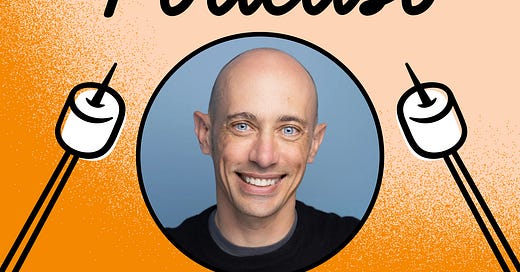Listen now on Apple, Spotify, and YouTube.
Brought to you by:
• Sinch—Build messaging, email, and calling into your product
• Liveblocks—Ready-made collaborative features to drop into your product
• Loom—The easiest screen recorder you’ll ever use
—
Tobi Lütke is the founder and CEO of Shopify, a $130 billion business that powers over 10% of all U.S. e-commerce. Starting as a snowboard shop in 2004, Shopify has become the leading commerce platform by consistently approaching problems differently. Tobi remains deeply technical, frequently coding alongside his team, and is known for his unique approach to leadership, product development, and company building. In our conversation, we discuss:
Why complexity kills entrepreneurship
How to develop and leverage your unique talent stack
How specifically Tobi approaches thinking from first principles
The importance of focusing on unquantifiable qualities like joy and delight
Why Tobi works backward from a 100-year vision
Why metrics should support decisions, not make them
The power of following your curiosity
What Tobi believes it takes to be a great product leader
Much more
Some takeaways:
Everyone has more potential than they realize. Don’t shy away from providing tough feedback that challenges them to aim higher. As leaders, it’s our job to help others see the best version of themselves, even if it means pushing them outside their comfort zone. The best growth happens when you’re constantly nudging yourself and your team to do better than they thought they could.
Metrics are important, but they should support your decision-making, not drive it. Focus on things like joy, pride, and the satisfaction of a job well done. When people are passionate and enjoy their work, the numbers will follow. Trust that fun and delight are powerful drivers of success.
Work backward from a long time horizon:
A 100-year perspective helps optimize for lasting impact over short-term gain
Playing positive-sum games with customers becomes the ultimate growth strategy
Long-term thinking enables better partnership decisions and helps resist value extraction
Just as founders inject energy into their startups, you need to find what drives your passion and energy. Is it dissatisfaction with the status quo? Is it a rivalry, or a desire to build something better? Understanding your source of energy can help you remain motivated through challenges and lead your business with conviction.
Great product leadership requires three key elements:
The ability to see around corners and anticipate what’s coming
Infectious enthusiasm and genuine care about the product
Getting the team to deeply care about what they’re building
Disagreeing with someone might seem confrontational, but it builds trust when done constructively. When you’re in a meeting or discussing ideas, don’t be afraid to voice your differing opinion. Just make sure it’s backed by thoughtful reasoning and clarity on assumptions. This openness promotes healthier discussions and can lead to better decisions.
You need both a positional game (long-term strategy) and tactics (short-term wins). Too many focus only on tactics—getting the immediate conversion or winning the next A/B test. But true growth comes from setting yourself up for success in the long run, shaping your company’s role in the ecosystem, and building trust over time.
In any product, the user experience matters. A well-designed interface doesn’t just make a product easier to use—it can literally make the difference between success and failure. Ensure that your product makes complex tasks simple for users, and remove barriers that might stop them from succeeding.
If you’re feeling scared to launch something, reframe it as an experiment. Take the pressure off yourself and simply focus on learning. By lowering the emotional stakes, you’ll be able to take risks and move faster without letting fear hold you back.
Where to find Tobi Lütke:
• X: https://x.com/tobi
• LinkedIn: https://www.linkedin.com/in/tobiaslutke/
• Website: https://tobi.lutke.com/
In this episode, we cover:
(00:00) Welcome and introduction
(04:17) The Tobi tornado
(07:10) Maximizing human potential
(11:05) Education and personal growth
(16:47) Operating without KPIs
(25:00) First-principles thinking
(40:04) Remote work
(45:59) Why Tobi never stopped coding
(54:46) Embracing disagreement
(01:01:27) The 100-year vision
(01:09:29) Balancing tactics and positioning
(01:17:15) Encouraging entrepreneurship
(01:19:34) The power of good UX
(01:28:42) The talent stack and unique opportunities
(01:34:30) The role of passion in product development
(01:36:39) Final thoughts and farewell
Referenced:
• How Shopify builds a high-intensity culture | Farhan Thawar (VP and Head of Eng): https://www.lennysnewsletter.com/p/how-shopify-builds-a-high-intensity-culture-farhan-thawar
• Breaking the rules of growth: Why Shopify bans KPIs, optimizes for churn, prioritizes intuition, and builds toward a 100-year vision | Archie Abrams (VP Product, Head of Growth at Shopify): https://www.lennysnewsletter.com/p/shopifys-growth-archie-abrams
• The ultimate guide to performance marketing | Timothy Davis (Shopify): https://www.lennysnewsletter.com/p/performance-marketing-timothy-davis
• Brandon Chu on building product at Shopify, how writing changed the trajectory of his career, the habits that make you a great PM, pros and cons of being a platform PM, how Shopify got through Covid: https://www.lennysnewsletter.com/p/brandon-chu-on-what-its-like-to-build
• IRC: https://en.wikipedia.org/wiki/IRC
• Goodhart’s law: https://en.wikipedia.org/wiki/Goodhart%27s_law
• Glen Coates on LinkedIn: https://www.linkedin.com/in/glcoates/
• How Shopify builds product: https://www.lennysnewsletter.com/p/how-shopify-builds-product
• The Last Dance on Netflix: https://www.netflix.com/title/80203144
• Autoregressive Models for Natural Language Processing: https://medium.com/@zaiinn440/autoregressive-models-for-natural-language-processing-b95e5f933e1f
• Archimedean property: https://en.wikipedia.org/wiki/Archimedean_property
• Tabula rasa: https://en.wikipedia.org/wiki/Tabula_rasa
• Daniel Weinand on LinkedIn: https://www.linkedin.com/in/danielweinand/
• World of Warcraft: https://worldofwarcraft.blizzard.com
• Harley Finkelstein on LinkedIn: https://www.linkedin.com/in/harleyf/
• Monorepo: https://en.wikipedia.org/wiki/Monorepo
• The Sarbanes Oxley Act: https://sarbanes-oxley-act.com/
• Shopify builds Shopify Balance with Stripe to give small businesses an easier way to manage money: https://stripe.com/customers/shopify
• Stanford marshmallow experiment: https://en.wikipedia.org/wiki/Stanford_marshmallow_experiment
• Brian Armstrong on LinkedIn: https://www.linkedin.com/in/barmstrong/
• We are the Web: https://link.wired.com/public/32945405
Recommended books:
• Finite and Infinite Games: https://www.amazon.com/Finite-Infinite-Games-James-Carse/dp/1476731713
• The Infinite Game: https://www.amazon.com/Infinite-Game-Simon-Sinek/dp/073521350X/
Production and marketing by https://penname.co/. For inquiries about sponsoring the podcast, email podcast@lennyrachitsky.com.
Lenny may be an investor in the companies discussed.













Share this post